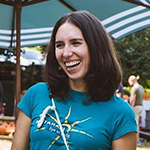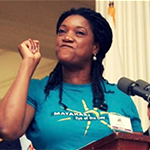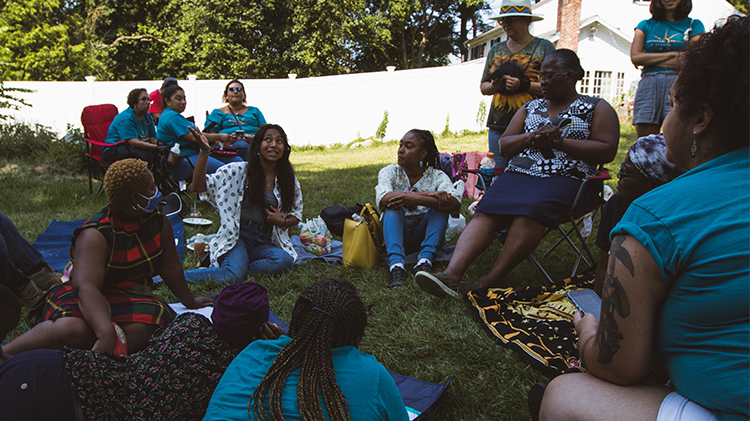“I just know I need to leave the job,” Bruna (whose name has been changed to protect privacy) said through the Zoom screen as she finished telling our group about the increased demands, stagnant wages, and disrespect she was experiencing from her employer. “I was just diagnosed with high blood pressure—I never had this before! If I stay, this job will just keep harming my health,” she concluded.
One by one, we went around our circle, providing her with similar experiences and words of encouragement and appreciation for sharing her story. One group member agreed to help her compose a resignation letter to her employer, and others offered tips on how to document her hours to claim back wages. We ended the circle with a deep breathing exercise as well as “air hugs” and well wishes to each other.
Starting with listening
At Matahari, a grassroots organization working to end the exploitation of women and femme workers, this type of healing activity has become a key part of our organizational priorities over the last several years. Most Matahari members are domestic workers. Many of them are nannies, au pairs, home care workers, and house cleaners. They come from Asia, Latin America, the Caribbean, Africa, and the United States—and now more than ever, they need community-driven solutions for health.
Our Healing Justice Initiative shows that providing a creative, integrative space for individual and collective healing within our communities not only provides positive health benefits but can also empower and activate women to become leaders in social justice movements. Healing Justice provides a framework “to intervene and respond to intergenerational trauma and systemic oppression,” recognizing that our emotional, physical, spiritual, psychic, and environmental well-being is an act of resistance and central to our movements for social change.
When the pandemic began in the U.S., Matahari launched a listening campaign, which Bruna was a part of, to see what types of support our members needed. Leaders called nearly 100 members and their families. They were distressed, depressed, and wanted to talk. In addition to financial and housing needs, it was clear that their mental health needs were not being met. We wanted to build a project within the organization that would help respond to these unmet needs, and so we launched the Healing Justice Initiative within Matahari.
Of course, the need for mental health and healing has always been present in our communities, long before the pandemic. Domestic work has always been a challenging industry because it often leaves people alone and doesn't pay enough. It's also very common for workers to be abused physically, sexually, or both. Added on top of this is the daily racism and exploitation many of our members face as women of color and immigrants in the United States, as well as the historical and generational trauma and the circumstances that led to our emigration from our home countries.
The power of collective wisdom and intuition
Through Matahari's Healing Justice Initiative, we used the knowledge of leading healing justice organizers from across the U.S., like Cara Page, Erica Woodland, Patrisse Cullors, Tamika Middleton, and Lakshmi Piepzna-Samarasinha, to shape the work of the initiative. Healing justice uses the ancient wisdom of our ancestors and the history of resistance, especially the legacies of Black women. Healing justice is not new, but as a political strategy, it was conceived in 2005 and formally launched in 2006 by the Kindred Southern Healing Justice Collective.
True to form, our Healing Justice Initiative was shaped not only by these inspiring organizers but also by the wisdom and intuition of the people on our Healing Justice committee. We are a group of 12 member leaders and two staff organizers. This group continues to guide the work of healing justice within the organization today. We do this in three main ways:
First, we provide a space for mutual support and to talk and heal. Last year, we contracted with a therapist and ran a group therapy series for members and held spaces for group support in all of our meetings. We’ve hosted a series of community walks to help people, especially at the height of the pandemic, get outside, move their bodies, be with their community, and engage their creativity through art expression. With our healing spaces, we want to show that healing from collective trauma requires healing as a group.
Second, we are resisting the idea that healing always has to take place in a hospital or clinic. A capitalist health care system that tries to control healing is to blame for how hard it is to get mental health care and health care in general. That’s why we work to reclaim our healing gifts passed down to us from our ancestors and borne from our life experiences. We connect with the earth and share the wisdom of our ancestors. During group meetings, we share healing offerings and help each other learn new modalities. People have shared workshops on meditation, yoga, prayer, writing, and affirmations.
Thirdly, we know that healing is vital to our movement in Matahari and are working to integrate healing into all the organizing work we do, so that organizing can remain something joyful and life-giving rather than leading to burnout. That looks like grounding exercises before and after giving testimony, deep check-ins and healing exercises at all our meetings, and supporting people in their leadership journey over the long haul. Through integrating healing justice, we aim to truly create the world we want to see through our organizing.
We invest in the healing of all of our members in addition to preparing our leaders to testify, march together, and plan campaigns. In doing so, we are not only building a stronger movement and resisting burnout but also showing the value and possibility of community-driven solutions for health and wellness.
About the authors
 |
Juliana Morris, MD, is a primary care doctor in Chelsea, Massachusetts and the Healing Justice Coordinator, at the Matahari Women Workers’ Center. Matahari was founded in 2002, and over the years the organization has fought for (and won!) the Massachusetts Domestic Worker Bill of Rights, won back stolen wages for workers, and successfully stopped the deportation of Matahari members. |

|
Angella Foster is the Director of Member Engagement and Outreach at the Matahari Women Workers’ Center. |
**Feature photo was taken by Stephanie DelCastillo on Sept. 2022 during a Matahari leaders' meeting.
Interested in other articles like this? Subscribe to our monthly newsletter.
Interested in contributing to the HMS Primary Care Review? Review our submission guidelines.
- Share
-
Permalink


